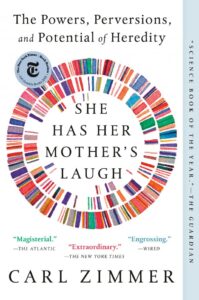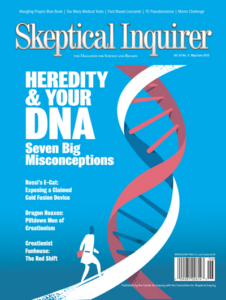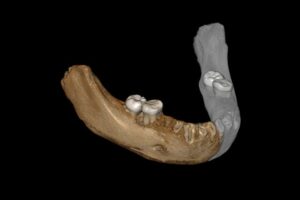Book alert! She Has Her Mother’s Laugh is coming out in paperback on June 4. I’m delighted to share the snazzily updated cover:

You can pre-order it now from fine book mongers, including Amazon, Barnes and Noble, BAM, Hudson Booksellers, and IndieBound.

Seven Misconceptions about Heredity
In the cover story for the May/June issue of Skeptical Inquirer, I explore some of the biggest misconceptions about heredity. With the ongoing explosion of DNA testing, it’s urgent that we understand what the results of those tests can and cannot tell us.

So long, Denisova
Eight years ago, I had the privilege to introduce a new word into the New York Times lexicon: Denisovan. I was writing about the discovery of human-like DNA in a fossil tooth in a Siberian cave called Denisova. It represented a new lineage of humans, which the researchers named after the cave.
As the years passed, archaeologists found more Denisovan remains in the cave, spanning over 200,000 years. But they didn’t find any Denisovans anywhere else, despite compelling–albeit indirect–evidence that they lived across much of Asia, and perhaps beyond.
Now, at last, a Denisovan beyond Denisova has come to light. The irony is that the fossil was actually discovered 40 years ago in Tibet. You can read my story about this remarkable development here.
PLUS…
Here are some of the stories I enjoyed reading this past month–
Reassessing Seal Rescue, by Cathleen O’Grady (Hakai)
Jakarta Is Sinking, by Matt Simon (Wired)
US Science Academy Leaders Approve Plan to Expel Sexual Harassers, by Sara Reardon (Nature)
Permafrost Collapse Is Accelerating Carbon Release, by Merritt R. Turetsky et al (Nature)
U.N. Issues Urgent Warning on the Growing Peril of Drug-Resistant Infections, by Andrew Jacobs (New York Times)
Scientists Discover Nearly 200,000 Kinds of Ocean Viruses, by Jonathan Lambert (Quanta)
The World Lost a Belgium-sized Area of Primary Rainforests Last Year, by Mikaela Weisse and Elizabeth Dow Goldman (World Resources Institute)
How Kenya’s Push for Development Is Threatening Its Famed Wild Lands, by Adam Welz (Yale e360)
USDA orders scientists to say published research is ‘preliminary’ By Ben Guarino (Washington Post)
‘I Want What My Male Colleague Has, and That Will Cost a Few Million Dollars’, by Mallory Pickett (New York Times)
Scientists Partly Restore Activity in Dead-Pig Brains, by Ed Yong (The Atlantic)
Facing Up to Injustice in Genome Science, by Giorgia Guglielmi (Nature)
Upcoming Talks
May 16, 2019 Ames, Iowa. Genome Writer’s Guild
May 25-26, 2019 Copenhagen: Bloom Festival.
June 23, 2019 Providence, RI. Society for the Study of Evolution. Vice Presidential Symposium: Politics, the Public, and Science: Navigating the New Reality”
July 2, 2019 Lausanne, Switzerland. World Conference of Science Journalists
July 13, 2019 New York. Northeast Conference on Science and Skepticism Keynote Address
August 31, 2019 Decatur, GA. Decatur Book Festival.
NEW–> September 17, 2019 Washington, DC. Smithsonian. “An Evening With Carl Zimmer.” Details to come.
NEW–> October 23, 2019 San Francisco. Arts & Ideas at the JCCSF. Details to come.
NEW–> October 24, 2019 San Francisco. The Exploratorium. Details to come.
November 21, 2019 Paris. TimeWorld 2019
You can find information and ordering links for my books here. You can also follow me on Twitter, Facebook, Goodreads, and LinkedIn. If someone forwarded this email to you, you can subscribe to it here.
Best wishes, Carl
Originally published May 3, 2019. Copyright 2019 Carl Zimmer.


